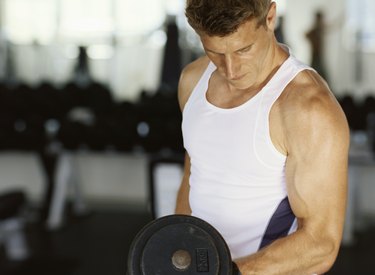
Whether you're lifting barbells in the gym or moving house furniture, it's probably your natural inclination to hold your breath. Improper breathing technique can quicken fatigue, cause dizziness and increase your blood pressure, which can lead to fainting. By breathing correctly when lifting, you will likely have a higher degree of control and alertness during your exercise. Breathing correctly can help you avoid weight-room-related injuries. Never start this or any new exercise regimen without consulting your doctor first.
Step 1
Do some deep breathing exercises before you start your workout session. Close your eyes and take in a deep breath through your nose, hold it for one or two seconds and let it go through your mouth. Repeat this for a few minutes. Deep breathing before you exercise sets the stage for controlled breathing during your workout. It relaxes you and makes you more conscious of your breathing.
Video of the Day
Step 2
Breathe out as you lift the weight. Begin breathing out right as you pick up the weight. For example, on a bench press you fully exhale through your nose or mouth as you push the barbell away from your chest.
Step 3
Breathe in through your nose in a controlled manner as you lower the weight. Lowering weight requires less exertion, which makes it an ideal time to inhale.
Step 4
Avoid using the Valsalva maneuver during lifting. The Valsalva maneuver refers to holding one's breath during lifting. It is commonly used by professional power lifters but it runs the risk of increasing your high blood pressure, which can lead to fainting or a heart attack. According to the British Journal of Sports Medicine, using the Valsalva maneuver during either the single arm curl or double knee extension produced the highest blood pressure response in the beginner weightlifters used as subjects in the study.
Tip
Start lifting with light weights until breathing correctly becomes second nature. Heavy weights demand more concentration and strength, which makes it easier to break concentration and forget to breathe correctly. If you have to hold your breath to lift the weight, then it's too heavy.
Video of the Day